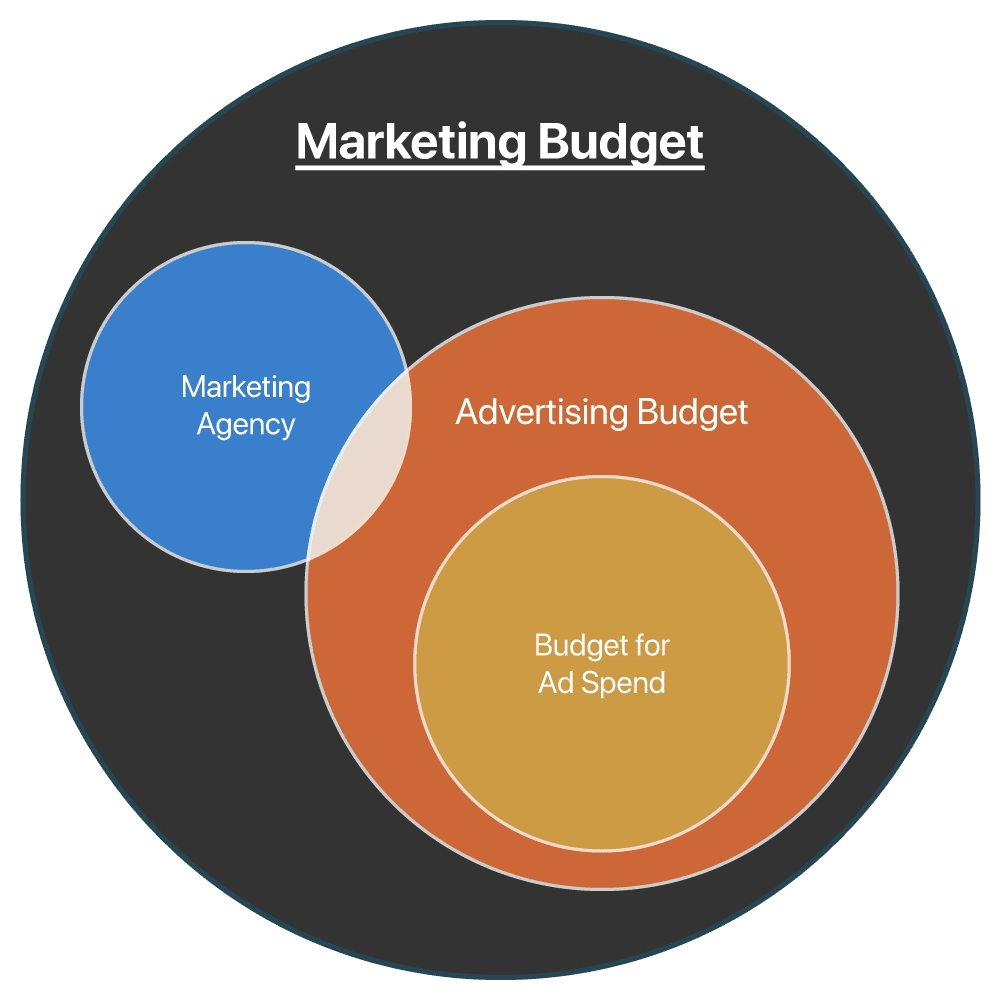Ever feel like you're throwing money into a black hole when it comes to advertising?
Well, you're not alone.
Ad budget management is one of those crucial skills that can make or break your marketing efforts. It's like trying to juggle while riding a unicycle – tricky, but oh-so-rewarding when you get it right!
In this article, we're going to explore the right ways how to make every dollar count and turn your advertising spend into a lean, mean, ROI-generating machine. Stick around as we unpack the secrets to stretching your ad budget further than you ever thought possible.
Now without any further adieu, let's get started!
An advertising budget is a financial plan that outlines the amount a company allocates for promoting its products or services over a specific period. It's a crucial component of a business's overall marketing strategy, helping to ensure that promotional efforts are well-funded and aligned with organizational goals.
Why is Ad Budget Management Important?
Ever wondered why some businesses seem to get more bang for their advertising buck? The secret lies in effective ad budget management. It's not just about throwing money at ads; it's about strategically allocating your resources for maximum impact.
Proper ad budget management helps you avoid overspending, ensures your marketing efforts align with your business goals, and maximizes your return on investment (ROI). It allows you to track your spending, measure campaign performance, and make data-driven decisions to optimize your advertising strategy.
Carefully managing your ad budget, you can reach your target audience more effectively and ultimately drive growth for your business. Well, it's not about how much you spend, but how wisely you spend it!
Ad Budget Vs Marketing Budget

While often confused, marketing and advertising budgets are distinct.
A marketing budget encompasses all activities related to promoting and selling products or services, including market research, public relations, and product development.
An advertising budget, on the other hand, is specifically dedicated to paid promotional efforts such as TV commercials, print ads, and digital advertising campaigns
Key Components of Advertising Budget
How to Determine an Appropriate Ad Budget?
Determining an appropriate ad budget requires a strategic approach. Start by clearly defining your marketing objectives, as these will guide your spending decisions. Next, analyze your target audience to understand where and how to reach them effectively.
Assess your current financial situation to ensure your budget aligns with your overall business goals. Research industry benchmarks to gain insights into typical spending patterns in your sector. Evaluate the performance of your past advertising efforts to identify what worked and what didn't.
Consider your sales cycle and any seasonal fluctuations that might affect your advertising needs. a thoughtful approach to budgeting can lead to more effective advertising and better returns on your investment.
🎯 Factors to Consider When Setting Ad Budget
When setting an advertising budget, several key factors must be considered. The company's size and revenue provide a baseline for potential spending capacity. Industry and market conditions, along with competition levels, influence the necessary investment to stand out.
The product's lifecycle stage determines the intensity of promotional efforts required. Understanding target audience characteristics helps in selecting the most effective marketing channels.
Available marketing channels impact budget allocation across different platforms. Overall business goals guide the alignment of advertising expenditure with broader company objectives.
Making Your Ad Budget Work Harder
Getting the most bang for your buck in advertising is a must for anyone in marketing. It’s all about using data smartly and keeping a close eye on how things are going so you can tweak your approach and get the best results.
🧠 Smart Use of Data
Using data for effective ad budget management is crucial for optimizing your advertising efforts. By closely monitoring key performance indicators (KPIs), you can make informed decisions to allocate your budget wisely. Start by analyzing your Click-Through Rate (CTR) to gauge ad relevance and appeal.
Track your Conversion Rate to understand how well your ads are turning clicks into desired actions. Keep a close eye on Cost per Acquisition (CPA) to ensure you're not overspending to acquire customers. Return on Ad Spend (ROAS) is vital for measuring the overall effectiveness of your campaigns in generating revenue.
By regularly reviewing these metrics, you can identify high-performing campaigns to invest more in, and underperforming ones that may need adjustment or termination. Remember, data-driven budget management allows for continuous optimization, helping you maximize your advertising ROI.
Ad Budget Optimization
Effective ad budget optimization is crucial for maximizing your return on investment (ROI). Start by clearly defining your marketing objectives and analyzing your target audience. Regularly monitor key performance indicators (KPIs) such as Click-Through Rate (CTR), Conversion Rate, Cost per Acquisition (CPA), and Return on Ad Spend (ROAS).
Use these metrics to identify high-performing campaigns and allocate more resources to them while adjusting or pausing underperforming ones. Experiment with different ad formats, placements, and targeting options to find the most cost-effective combinations.
Consider using automated tools like Facebook's Campaign Budget Optimization (CBO) to dynamically allocate budgets across a1d sets based on performance. Remember to adjust your strategy based on seasonal trends and market conditions.
To keep things running smoothly, you should:
- Set up automated reports for real-time updates.
- Regularly review performance data.
- Adjust bids and budgets based on how things are going.
- Test and tweak ad creatives and placements.
Calculating Ad Budget
Managing your ad budget effectively is all about getting the numbers right and tweaking them based on how things are going. Here are some important ad budget formulas that might be helpful for your ad campaign optimization and management.
Ad Budget = (10-12% of Projected Annual Gross Sales) x Markup on Average Transaction
Monthly Budget / Cost Per Click (CPC) = Number of Visits to Landing Page
(Desired Number of Conversions) / (Conversion Rate) x (Cost Per Click) = Ad Budget
Total Cost = Number of Clicks x Cost Per Click
Total Cost = Number of Impressions x Cost Per Impression
Adjusting Budget Based on Results
You’ll need to keep an eye on your ad performance and adjust your budget to get the best bang for your buck. Regularly check your key metrics and spending. Make decisions based on data to allocate your funds better.
A handy way to adjust your budget is the 70-20-10 rule:
- 70% to stuff that’s already working
- 20% to things that might work
- 10% to new and untested ideas
This way, most of your budget goes to proven winners, but you still have room to try new things.
For more tips on making your ad campaigns better, check out our articles on ad campaign optimization.
Regularly tweaking your budget based on these metrics, can fine-tune your strategies and make your ad spend more efficient. This approach ensures your marketing team has what they need to drive revenue and hit your goals.

PiPiADS (20% OFF)
Try Out PiPiADS for running in-depth TikTok Ads analysis, perform TikTok advertiser research and product hunt for your dropshipping and marketing operations.
Use the code “BLOGE20” to get 20% Off on all PiPiADS Plans.
Tackling Ad Budget Headaches
Managing an ad budget can feel like juggling flaming torches—one wrong move, and things go up in smoke. Let's break down the common pitfalls and how to dodge them.
Budgeting Blunders
Fixing the Fumbles
For more tips on optimizing your ad campaigns, check out our article on ad campaign optimization.
Common Queries on Ad Budget Management
How Do I Determine My Advertising Budget?
Consider factors like company size, revenue, industry benchmarks, competition, target audience, and overall business goals. Use methods like percentage of sales or objective-based budgeting.
What are Key Performance Indicators (KPIs) for Ad Budget Management?
Important KPIs include Click-Through Rate (CTR), Conversion Rate, Cost per Acquisition (CPA), and Return on Ad Spend (ROAS).
How Often Should I Review My Ad Budget?
Regularly review and adjust your ad budget, ideally monthly or quarterly, to respond to performance data and market changes.
What's the Importance of Ad Scheduling in Budget Management?
Ad scheduling helps display ads when your target audience is most active, optimizing exposure and potentially increasing ROI.
How does Bidding Strategy Affect Ad Budgeting?
Bidding strategies like CPC, CPM, or CPA determine how much you pay per interaction, significantly impacting overall budget allocation and performance.
Ready for the ROI Trekking?
And there you have it, folks! Ad budget management might seem like a daunting task, but with the right strategies and a bit of diligence, you can turn it into a powerful tool for your business. Remember, it's not about having the biggest budget, but about making every dollar work its socks off.
Setting clear objectives, analyzing your data, and continuously optimizing your campaigns can make every dollar work harder for you.
Well, that's it for now, hopefully, you might have something that could help you in ad budgeting.
Let the ROI climb to greater heights!







